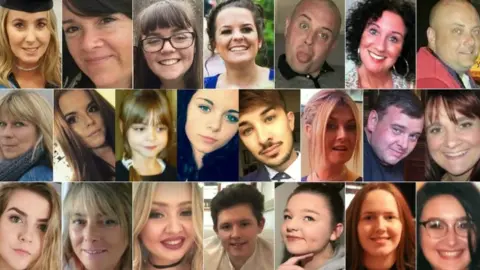Manchester Arena attack inquests: Evidence 'risks national security'
 Various
VariousFears of humiliating police and security services will not determine whether Manchester Arena attack evidence is kept secret, a coroner has said.
Authorities say some details could harm national security if made public at an inquest into the deaths of 22 people.
Lawyers for their families said those seeking to restrict material were also "in the firing line" for criticism.
Sir John Saunders will make his ruling at a later date.
Police and security services have submitted the public interest immunity ruling application, backed by Home Secretary Priti Patel.
Sir James Eadie QC, representing the Home Office, said national security held the "whip hand" and was "at the very top of the tree in terms of protection of the public and, therefore, public interest".
While public, open justice was "a thoroughly important matter", he said, the balance lay in favour of not making public information that may be of use to terrorists.
'National humiliation'
However, lawyers for the families said transparency was essential.
John Cooper QC, who told a previous hearing he had been made aware of "embarrassing" evidence which highlighted the "shortcomings" of the security services, said "national security may not be the concern, but instead national humiliation".
Pete Weatherby QC, also representing the bereaved, added that there was "fear from the families that the public interest immunity applications are being cast too wide".
"We urge you to take a very anxious approach to the scrutiny of these matters."
Sir John told the hearing at Manchester Town Hall that in considering the application, he would not take anyone's humiliation into account and the families will have to "take his word" that he will investigate the authorities thoroughly.
The court was also told the coroner would consider converting the inquest into a public inquiry, which would allow evidence to be heard in closed sessions without the bereaved families present.
Such a move, which also has the support of the home secretary, would allow the evidence to be taken into account when the inquiry's findings were produced.
Twenty-two people were killed and hundreds were injured when Salman Abedi, 22, detonated a device at the end of an Ariana Grande concert on 22 May 2017.
His brother, Hashem Abedi, 22, has been charged with murder and attempted murder.
An earlier pre-inquest review heard Mr Abedi denies helping his brother carry out the attack.
Sir John previously told families it was "extremely unlikely" inquest evidence would be heard before the trial ended.
The inquests are scheduled to begin on 2 April next year.
